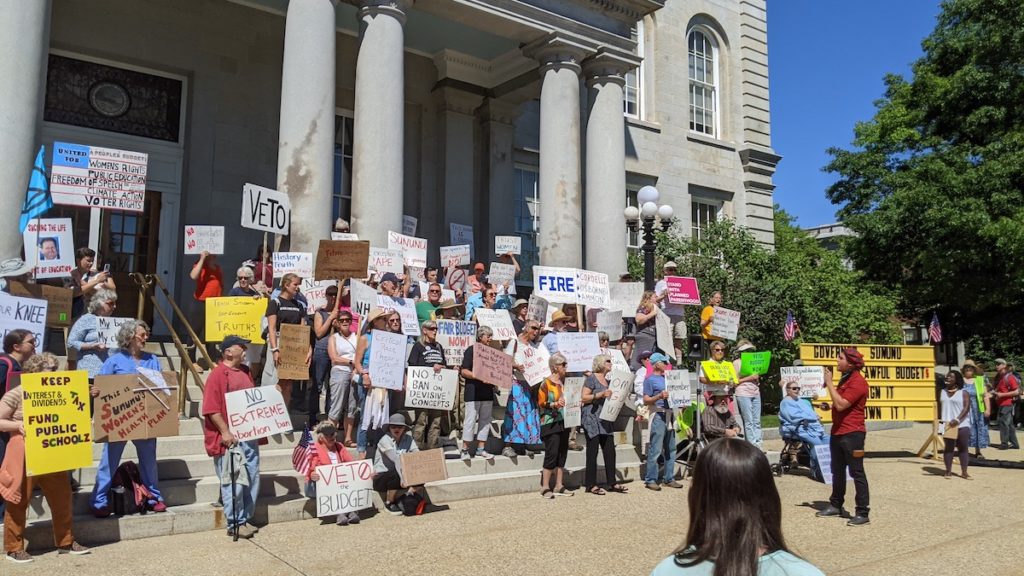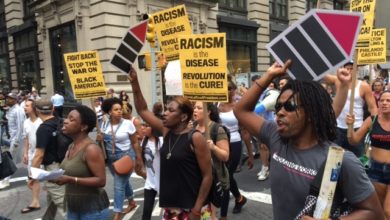A new bill in the New Hampshire state legislature, HB 1255, would all but explicitly ban the mention of Indigenous genocide and race-based chattel slavery in New Hampshire classrooms. The bill is an escalation of the language on “divisive concepts” included in the 2022 budget that Republican Governor Chris Sununu signed into law in the summer of 2021.
Exhuming the bones of the red scare, HB 1255 updates a 1949 Cold War “Teachers’ Loyalty” Law to include the following language:
No teacher shall advocate any doctrine or theory promoting a negative account or representation of the founding and history of the United States of America in New Hampshire public schools which does not include the worldwide context of now outdated and discouraged practices. Such prohibition includes but is not limited to teaching that the United States was founded on racism.
An educator reported in violation of HB 1255 would undergo a review process by the Board of Education and could have their teaching license suspended or revoked.
Teachers and public speak out
Devon Chaffee, executive director of the New Hampshire ACLU, told NHPR, “This bill would unconstitutionally restrict New Hampshire teachers from covering America’s legacy of racism and slavery, building on the disturbing trend we’ve seen this year of putting teachers at risk of professional discipline and lawsuits for teaching about these difficult topics.”
During a Jan. 20 public hearing on the proposed bill, Tom Newkirk, a school board member for Oyster River Cooperative School District, said, “There is a particular danger in the vagueness of this proposed law. Teachers will not know what is prohibited, and what is allowed. And with their teaching credentials at stake, who would blame them if they didn’t touch topics like Japanese internment?”

Chaffee and Newkirk are not alone in their concerns about HB 1255. Only 26 commenters supported the bill and over 2,200 opposed it during the public hearing.
Alicia Lekas, the sponsor of the bill, is now backpedaling under the weight of public dissent. She says she “ran out of time” when writing the bill. But she is reworking it.
Right-wing attacks ‘Critical Race Theory’
Two proposed bills in 2021 garnered similar public dissent and are now law in modified versions. HB 544 proposed a vaguely worded ban on teaching “divisive concepts” in New Hampshire schools. After strong opposition during the public hearing, the state senate tabled the bill. However, an amended version was written into the state budget. Another bill, HB 625, proposed an abortion ban after 24 weeks and was also added to the state budget.
Gov. Sununu refused to veto the budget, despite massive public outcry. In June, approximately 100 protesters occupied the state house to voice their objections.
The NH Department of Education launched a webpage last November allowing parents and students to lodge complaints against teachers for discussing “divisive concepts.” An educator found in violation of the law could face loss of employment and licensure.
There are two pending lawsuits against the “divisive concept” law, from the ACLU and major teachers unions in the state.
What is happening in New Hampshire is neither isolated nor a mistake. According to Reds in Ed, it is part of the right-wing war on the accurate teaching of United States history, called “Critical Race Theory.” The non-profit PEN America has tracked 54 bills attacking CRT introduced across the country, funded by dark money groups. Ten of these bills have passed.
Educators fight back in New Hampshire
It is not yet clear if the New Hampshire House will hold a vote on HB 1255 after the overwhelming public outcry.
The New Hampshire House and Senate have introduced HB 1576 and SB 298, respectively, which would repeal the existing “divisive concepts” law.
The largest teachers union in New Hampshire helped write two bills that would go a step further in protecting the rights of educators to teach anti-racism. HB 1090 and SB 304 would repeal the existing law and add the following protection, “no education law of this state shall be construed to bar any school employee from teaching the historical or current experiences of any group that is protected from discrimination.”
You can join educators in their fight by offering public comment in support of HB 1090 and HB 1576. The in-person public comment period for both bills is on Feb. 8 in the Legislative Office Building at 33 N State St. Concord, NH. The hearing for HB 1090 is at 10:00 a.m. and the hearing for HB 1576 is at 11:00 a.m. Both are in room 205-207.
Online testimony in support of either bill can be submitted before 11:59 p.m. on Feb. 8 at this link. The committee hearing the bill is the House Education Committee.






